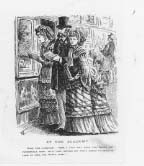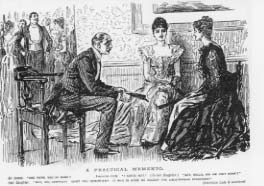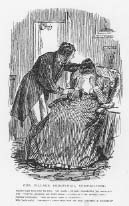Jennifer Malloy, p. 3.

Punch, 60 (June 10,1871):241
FRIVOLITY
 es some women are silly, and it is hard to tell why the Almighty made them,unless it was to match some of the men!"-Anna Dickinson
Four years after the National Association for Women's Suffrage was formed, W. Ralston published a cartoon entitled "At the Academy" in Punch, Volume 60, 1871. Having brought his two daughters to the prestigious Royal Academy of Art for the afternoon, 'Papa' is chastised for forcing them to peruse 'horrid' pictures on account of the 'unfashionable' hour of their arrival. Ralston strikes a jab at women in the public sphere through his drawings by representing young ladies as thoroughly without appreciation
for the intellectual and artistic elite, concerned solely with contemporary
social fashion. Although fairly subtle, in that Ralston chooses to
criticize young ladies rather than British matrons in the public domain,
the Victorian reader would understand the cartoonist's message that women
entering the public domain, i.e. politics, would use it purely for social
purposes and fail to grasp the inherent import of a traditionally male
sphere of influence.
es some women are silly, and it is hard to tell why the Almighty made them,unless it was to match some of the men!"-Anna Dickinson
Four years after the National Association for Women's Suffrage was formed, W. Ralston published a cartoon entitled "At the Academy" in Punch, Volume 60, 1871. Having brought his two daughters to the prestigious Royal Academy of Art for the afternoon, 'Papa' is chastised for forcing them to peruse 'horrid' pictures on account of the 'unfashionable' hour of their arrival. Ralston strikes a jab at women in the public sphere through his drawings by representing young ladies as thoroughly without appreciation
for the intellectual and artistic elite, concerned solely with contemporary
social fashion. Although fairly subtle, in that Ralston chooses to
criticize young ladies rather than British matrons in the public domain,
the Victorian reader would understand the cartoonist's message that women
entering the public domain, i.e. politics, would use it purely for social
purposes and fail to grasp the inherent import of a traditionally male
sphere of influence.
Jacob Bright, for one, has disputed such inferences
concerning the lack of female intellectual and artistic integrity. He
maintains that women have not been extended opportunities similar to those
accorded to males, and thus should not be condemned for their ignorance
"until the experiment has been fairly tried, and it has never yet been
fairly tried." He in turn provides examples of female accomplishment in
the arts, including the paintings of Rosa Bonheur and the musical prowess
of Mendelssohn's sister. "

Punch, 99 (July 5,1890):6
A Practical Memento," by George du Maurier,
published in Punch Volume 99, 1890, provides the reader with yet another example of female silliness depicted by the artists of this journal. A
mother and daughter are answering inquiries from an older gentleman
regarding a trip from which they have just returned. In response to
whether or not they had journeyed to Rome, the daughter reminds her mother
that they had indeed traveled to that old city, for it was there they had
purchased a pair of stockings. Apparently the architecture, the history,
the grandeur of an ancient civilization failed to impress the two women
greatly enough; their landmark was fashion-oriented. Du Maurier's title is
even mocking-- to journey to Rome and come away with a pair of stockings is
surely practical is it not? Or does the nature of the memento imply that
the ladies were unable to truly appreciate their situation? It is material
like the above which fans flames of arguments supporting the fact that
women are too silly and frivolous to use the franchise wisely. Arguments
that persist despite evidence to the contrary. "If women are exceptionally
silly, how is it that the highest political power sometimes (as now, in the
British Empire) devolves upon a woman [Queen Victoria]? Surely if a woman
is fit to attain the highest, she is also fir to stand on the lowest, step
of the political ladder."

Punch, 95 (28 July,1888):46
Hysteria has long been associated with women and the irrationality, etc.,
that is said to characterize the 'weaker' sex. "Our Village Industrial
Competition," by Charles Keene in 1888, Punch Volume 95, is a
representative work of the Victorian period. The rational husband soothes
his hysterical 'angel' after she was voted worst cake baker in the village.
The anecdote below the picture alone is rife with Victorian gender
prejudices. The characterization of 'wife' as 'angel' is appropriate to
the period, as is that of 'female' as 'hysteric,' which supports the
stereotype that "women ought not be entrusted with a vote, because they
were liable to panic."
Please turn to my next cartoon
[Victorian initial "Y" by Harlan Wallach ©copyright 1994.]
 es some women are silly, and it is hard to tell why the Almighty made them,unless it was to match some of the men!"-Anna Dickinson
Four years after the National Association for Women's Suffrage was formed, W. Ralston published a cartoon entitled "At the Academy" in Punch, Volume 60, 1871. Having brought his two daughters to the prestigious Royal Academy of Art for the afternoon, 'Papa' is chastised for forcing them to peruse 'horrid' pictures on account of the 'unfashionable' hour of their arrival. Ralston strikes a jab at women in the public sphere through his drawings by representing young ladies as thoroughly without appreciation
for the intellectual and artistic elite, concerned solely with contemporary
social fashion. Although fairly subtle, in that Ralston chooses to
criticize young ladies rather than British matrons in the public domain,
the Victorian reader would understand the cartoonist's message that women
entering the public domain, i.e. politics, would use it purely for social
purposes and fail to grasp the inherent import of a traditionally male
sphere of influence.
es some women are silly, and it is hard to tell why the Almighty made them,unless it was to match some of the men!"-Anna Dickinson
Four years after the National Association for Women's Suffrage was formed, W. Ralston published a cartoon entitled "At the Academy" in Punch, Volume 60, 1871. Having brought his two daughters to the prestigious Royal Academy of Art for the afternoon, 'Papa' is chastised for forcing them to peruse 'horrid' pictures on account of the 'unfashionable' hour of their arrival. Ralston strikes a jab at women in the public sphere through his drawings by representing young ladies as thoroughly without appreciation
for the intellectual and artistic elite, concerned solely with contemporary
social fashion. Although fairly subtle, in that Ralston chooses to
criticize young ladies rather than British matrons in the public domain,
the Victorian reader would understand the cartoonist's message that women
entering the public domain, i.e. politics, would use it purely for social
purposes and fail to grasp the inherent import of a traditionally male
sphere of influence.